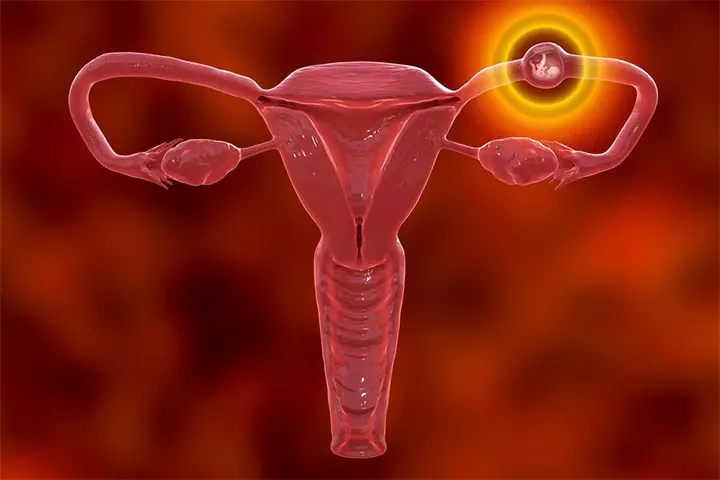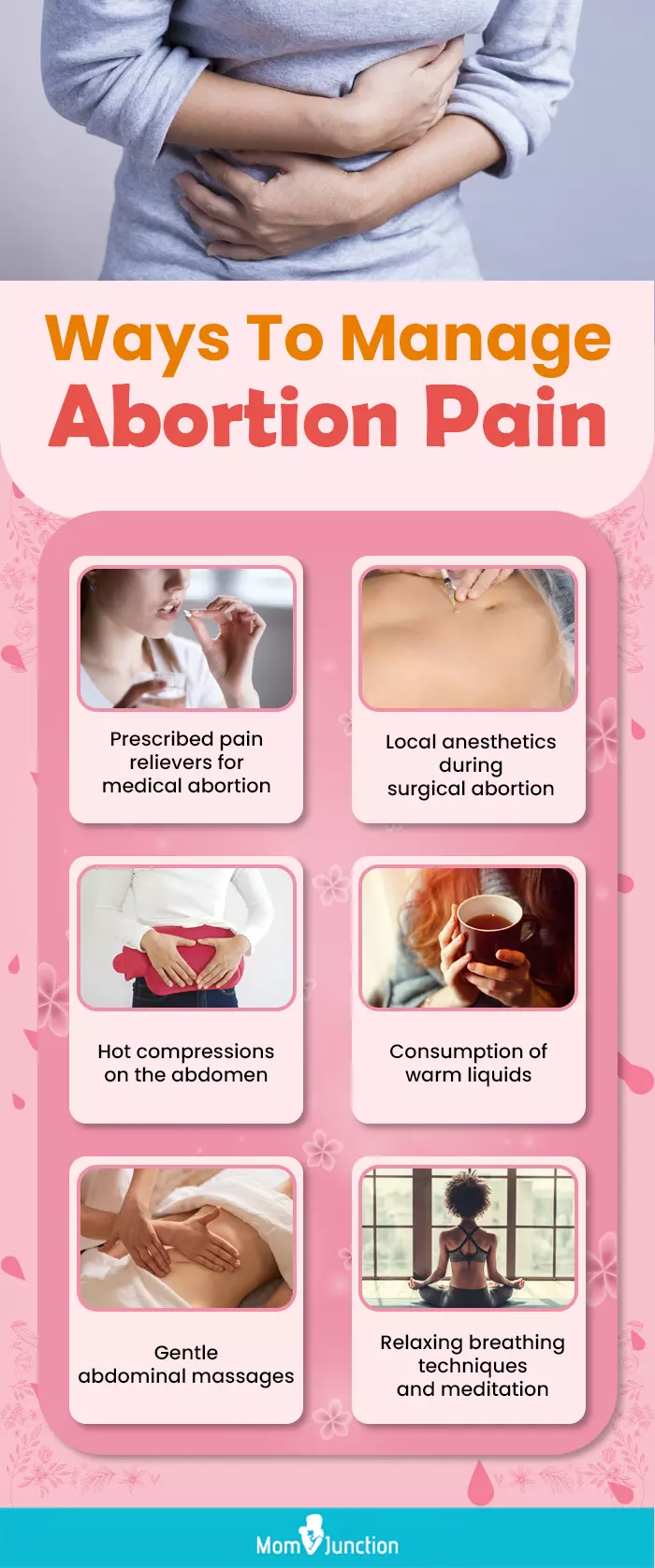
Image: Shutterstock
Does abortion hurt? In short, the experience of abortion is different for every woman. While most of them have intense period cramps, a few may have slight discomfort. It may hurt for a short time, and most women can get back to normal activities the next day. Some say abortion pain is more painful than a menstrual cramp and less painful than childbirth. Health care providers usually prescribe pain and anesthetic medications to treat and reduce the discomfort associated with abortion.
Learn more about abortion pain, how abortion works, ways to reduce the pain, and risks of abortion.
Key Pointers
- Abortion pain may vary in each woman depending on the type of abortion and weeks of gestation.
- Fetuses cannot feel the pain until they are viable to survive outside since pain signals are processed in the higher brain centers.
- Early abortions can be less painful, and prescription pain relievers may help reduce the pain.
How Do Abortions Work?
The embryo or fetus and the pregnancy tissues are expelled or removed from the uterus during an abortion. Doctors may suggest the method of abortion depending on the weeks of pregnancy and other factors.
According to the Abortion Surveillance reports by the Centers for Disease Control and Prevention, the prevalence rate of medical abortions within nine weeks is 51%, followed by surgical abortions at 13 weeks is 40%.
Abortions work in the following ways (1):
Medical abortion

A combination of medications is prescribed to induce pregnancy termination. The first oral medication stops pregnancy growth, and the second vaginal medication is given after one to three days. These medications cause the uterine lining to shed and expel the products of conception through the vagina. As a result, you may have cramps and bleeding at home.
Outlining her symptoms following a medical abortion using Cytotec (Misoprostol) pills, Abbie Burnham, a mother of three, states, “Before taking the pills, I had a very large lunch with a lot of protein and vegetables, drank a lot of water, and also took a prenatal vitamin. I lost a lot of blood during the miscarriage, and I think that the food and extra iron in my system were helpful in not fainting. Plus, the Cytotec creates nausea, so I couldn’t eat much later. I also took two Advil at this point (my doctor recommended an hour before placing the Cytotec) to help lower the pain of the initial cramping (i).”
 Things to know
Things to knowMedical abortion is recommended for four to nine weeks of gestational age. However, outcomes can be better in the earlier days. Around 95-97% of women have a successful abortion with these medications, and about 3-5% may require additional surgical procedures to remove retained pregnancy tissue (1).
You may visit the doctor at least two times before and after completing the abortion. Each visit may last up to half an hour for health education, examination, and ultrasound imaging of the uterus.
Surgical abortion
Surgical abortions, also known as in-clinic abortions, are procedures used to remove the uterus’ contents to end a pregnancy effectively. The following methods are used in surgical abortion (2):
- Suction curettage, vacuum aspirationiA surgical procedure of abortion in which gentle suction is used to remove the tissue from the uterus. , or Dilatation and Curettage (D&C) is a standard procedure to remove pregnancy of 5-12 weeks after missed menstruation.
- Dilatation and Evacuation (D&E) uses dilatation and forceps to remove the products of conception. This method is used to remove pregnancies over 14 weeks.
During the surgical abortion, the cervix is numbed and dilated after placing a vaginal speculumiA metal device used to expand vaginal walls to help the doctor better examine the vagina and cervix. . Then the suction device is used to empty the pregnancy tissue from the uterus. Doctors may consider surgical abortion as the first line of approach in cases of incomplete abortion, especially if the woman presents painful symptoms.
Around 98% of women have successful abortions, and only two percent may require repeated procedures (1). It is most effective if done between six and fourteen weeks of gestation.
How To Manage Abortion Pain?
Both surgical and medical abortions can be painful. Your healthcare providers may do the following to minimize the pain (1):
- For medical abortion: Medical abortions may cause strong cramps and symptoms such as nausea in some women. Over-the-counter pain relievers are enough to manage this pain. Anesthesia is not required. Doctors may recommend ibuprofen or acetaminophen (Tylenol), and/or Vicodin for pain relief.
- For surgical abortion: Most women experience cramping during or after the procedure. Numbing medications (local anesthetics) are applied to the cervix to avoid pain during cervical dilationiThe opening of the lowest part of the uterus to facilitate smooth delivery. . Doctors may also prescribe oral medications such as ibuprofen with or without Vicodin, valium, etc., to reduce the pain and discomfort.
In addition to these, the following measures might help alleviate pain and related symptoms post-abortion (3):
- Doctor-recommended pain relievers
- Drinking warm liquids, such as warm water, hot cocoa, or tea
- Using a hot compress (heating pad or a hot water bottle) on the abdomen

- Frequent uterine massages–press the abdomen with your fingers and rub from the belly button to the pubic area in a circular motion. Do it for at least ten minutes to relieve pain.
Does The Embryo Feel Any Pain?
According to the American College of Obstetricians and Gynecologists (ACOG), human fetuses cannot feel the pain until viability. Fetal viability is the ability of the fetus to survive outside the womb, which may occur by 23 to 24 weeks of pregnancy.
Here are a few facts about fetal pain (4):
- Studies show that brain connections are necessary to transmit pain signals from the peripheral nervous system and process them in the brain structures. These connections are not established until 24 weeks of pregnancy, and the fetus may not perceive pain until then.
- Pain is an emotional and psychological experience requiring recognition of stimulus. This capacity may not develop until the late weeks of the third trimester.
- Intrauterine fetal movement does not indicate the fetus can feel pain.
Are There Any Other Physical Risks Of Abortions?

Although abortions are safe for most women, there can be a small risk of complications in some cases. The risks may vary depending on the abortion method and weeks of pregnancy. Usually, the risk can be high in later pregnancy.
Common physical risks of medical and surgical abortion may include (5):
- Heavy bleeding
- SepsisiThe immune system’s abnormal reaction to infection that can cause damage to tissues and organs in the body.
- Uterus damage
- Retained pregnancy tissue requiring other procedures for removal
- Uterine infections
Contact your health care provider if you experience any issues after an abortion. Abortion is not known to increase the risk for infertility in the future. Most women can become pregnant immediately after an abortion, and doctors may recommend birth control measures if you are not planning to conceive sooner. Future fertility issues and ectopic pregnancy may be seen if the uterine infection after an abortion is not treated. This infection could spread to fallopian tubesiTubes connecting the ovaries and the uterus, and also creating a passageway for sperms to fertilize the egg. and ovaries, known as a pelvic inflammatory disease (PID).
 Be watchful
Be watchfulAre Emotional Side Effects Possible After An Abortion?

According to recent studies, an abortion does not increase a woman’s risk for emotional side effects and mental health disorders such as depression, anxiety, or post-traumatic stress disorders. According to American Psychological Association, women who experience these emotional issues after an abortion may have a co-occurring risk factor that leads to unintended pregnancy and mental health issues (6).
Women who deny abortion may experience low self-esteem, higher anxiety, and low life satisfaction than women who are able to make the choice themselves. In addition, experiencing multiple unwanted pregnancies can negatively affect a woman’s mental health in later life.
It is crucial to recognize that recuperation from any medical procedure, including abortions, is a distinctive and individual journey for every person. For those grappling with their emotional well-being during the recovery process, seeking professional support and care can prove to be advantageous.
When To See A Doctor?

It is recommended to seek advice from your healthcare provider to discuss suitable abortion options based on individual factors. Opting for an abortion is a personal decision. What is suitable for one may not be the same for another woman. Your doctor or nurse will help you explain the procedure and its advantages and disadvantages.
Frequently Asked Questions
1. What are the legal implications of having an abortion?
Laws governing medical abortion procedures differ from one country to another. In the US, as of the changes brought about in 2022, abortion policies and reproductive rights are under the jurisdiction of each state (9).
2. How does abortion affect a woman’s reproductive health?
Generally, an abortion does not affect a woman’s reproductive health. There may be a small risk if infections, such as pelvic inflammatory disease (PID) occur and remains untreated. However, most infections are usually treated before they may pose any risk, and you may receive antibiotics before abortion as a preventive measure (10).
3. Does the pain of an abortion depend on the stage of pregnancy?
A study showed that women undergoing abortion care at later gestations (second trimester) were more likely to report pain during the process (11).
4. How long does the pain of an abortion last?
The pain of an abortion may take at least one week to subside (12).
Abortion pain can be experienced by all women who went through it. Some may experience mild pain, while it can be severe for others. Seeking abortion from a licensed practitioner may reduce the risk of severe pain and future risks. Prescribed pain relief medications may help reduce abortion pain. It is always better to seek an early abortion if you are not planning to continue the pregnancy. Discuss the birth control measures with your doctor since it is possible to conceive soon after an abortion.
Infographic: Management Of Abortion Pain
Whether abortion is self-opted or due to any medical emergency, it can affect a woman’s body and emotional health. In addition to pain, a woman may have other physical risks too. Therefore, we’ve listed some pain management options you may consider after consulting a doctor.

Illustration: Momjunction Design Team
Illustration: Does Abortion Hurt And How To Cope With The Pain?

Image: Dall·E/MomJunction Design Team
Feeling pain during and after an early medical abortion can be overwhelming. Let’s explore how to manage it and get through it together.
Personal Experience: Source
MomJunction articles include first-hand experiences to provide you with better insights through real-life narratives. Here are the sources of personal accounts referenced in this article.
1. My experience with a Cytotec (Misoprostol) miscarriage.https://babyburnham.blogspot.com/2008/12/my-experience-with-cytotec-misoprostol.html?commentPage=3
References
- Medical Versus Surgical Abortion.
https://www.ucsfhealth.org/education/aspiration-versus-medication-abortion - Surgical abortion.
https://abortion.org.nz/abortion-procedures/surgical-abortion - Caring For Yourself After An Abortion.
https://www.plannedparenthood.org/planned-parenthood-michigan/healthcare/abortion-services/caring-for-yourself-after-an-abortion - Fetal Pain in the First Trimester.
https://journals.sagepub.com/doi/full/10.1177/00243639211059245 - Medical Abortion.
https://my.clevelandclinic.org/health/treatments/21899-medical-abortion - Abortion and Mental Health.
https://www.apa.org/topics/abortion - How does the abortion pill work?
https://www.plannedparenthood.org/learn/abortion/the-abortion-pill/how-does-the-abortion-pill-work - Risks of Abortion.
https://scdhec.gov/risks-abortion - After Roe Fell: Abortion Laws by State.
https://reproductiverights.org/maps/abortion-laws-by-state/ - Can having an abortion affect my fertility?
https://www.nhs.uk/conditions/abortion/risks/ - Ilana G. Dzuba et al.; (2022); Pain Side Effects and Abortion Experience Among People Seeking Abortion Care in the Second Trimester.
https://www.ncbi.nlm.nih.gov/pmc/articles/PMC9148646/ - Caring for yourself after your abortion.
https://www.bpas.org/abortion-care/aftercare-support/
Community Experiences
Join the conversation and become a part of our nurturing community! Share your stories, experiences, and insights to connect with fellow parents.
Read full bio of Dr. Mona Hardas
Read full bio of Dr Bisny T. Joseph
Read full bio of Rebecca Malachi
Read full bio of Reshmi Das

















